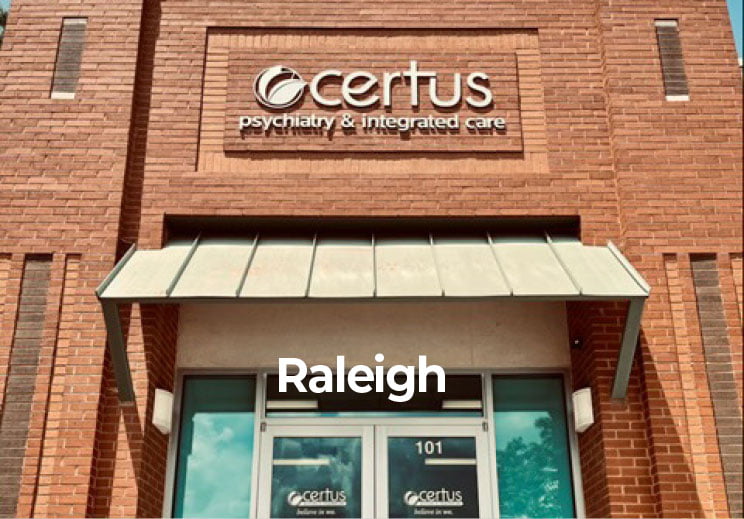Psychiatry Services in Raleigh, North Carolina

Certus Psychiatry services are evidence-based practices that help patients realize better mental health.
Dr. Gisela Kohl is a board-certified psychiatrist who leads the practice. She and her team of psychiatric healthcare professionals and therapists are here to help you realize the best possible outcomes.
All new patients receive an in-depth evaluation and consultation to lay the groundwork for their unique needs.
Conditions we commonly treat
Anxiety Disorders
Anxiety involves focusing on bad or dangerous things that could happen and worrying fearfully and excessively about them. Anxiety disorders include generalized anxiety disorder (GAD), panic disorder, and phobias (extreme or irrational fears of specific things, such as heights).
Bipolar Disorders
Bipolar Disorders are often seen as periods of excessive excitement, activity, and energy followed by periods of depression or anger. Bipolar II Disorder is a bipolar spectrum disorder characterized by at least one episode of hypomania and at least one episode of major depression. Diagnosis for bipolar II disorder requires that the individual must never have experienced a full manic episode.
Depression & Depressive Disorders
Depression symptoms often include feelings of sadness, emptiness, and loneliness even when around people; loss of interest in pleasurable activities; fatigue; irritability; changes in sleep patterns; changes in appetite, and more.
Disruptive, Impulse-Control, and Conduct Disorders
People with these disorders show symptoms of difficulty with emotional and behavioral self-control. Examples include kleptomania (repeated stealing) and intermittent explosive disorder.
Dissociative Disorders
These disorders disrupt the person’s sense of self, such as dissociative identity disorder and dissociative amnesia.
Feeding and Eating Disorders
These psychiatric disorders are disturbances related to eating, such as anorexia nervosa, bulimia nervosa, and binge eating disorder.
Gender Dysphoria
These disorders stem from the distress that goes with a person’s stated desire to be a different gender. The diagnostic criteria in this group differ somewhat among children, adolescents, and adults.
Neurocognitive Disorders
These psychiatric disorders affect people’s ability to think and reason. The disorders in this group include delirium as well as disorders of thinking and reasoning caused by such conditions or diseases as traumatic brain injury or Alzheimer’s disease.
Neurodevelopmental Disorders
Neurodevelopment disorders, like attention-deficit/hyperactivity disorder (ADHD), typically begin in childhood and are often thought to be genetic, though a lot is unknown as to what causes them. With Qbtech, we can better diagnose ADHD in both children and adults.
Obsessive-Compulsive and Related Disorders
People with these disorders experience repeated and unwanted urges, thoughts, or images (obsessions) and feel driven to take repeated actions in response to them (compulsions). Examples include obsessive-compulsive disorder (OCD), hoarding disorder, and hair-pulling disorder (trichotillomania).
Paraphilic Disorders
Many sexual-interest disorders are included in this group. Examples include sexual sadism disorder, voyeuristic disorder, and pedophilic disorder.
Personality Disorders
A personality disorder involves a lasting pattern of emotional instability and unhealthy behaviors that seriously disrupt daily living and relationships. Examples include borderline, antisocial, and narcissistic personality disorders.
Schizophrenia Spectrum and Other Psychotic Disorders
Psychotic disorders cause detachment from reality. People with these diagnoses experience delusions, hallucinations, disorganized thinking, and speech. Schizophrenia is probably the best known of these illnesses, although detachment from reality can sometimes affect people with other psychiatric disorders.
Sleep-Wake Disorders
These are severe sleep disorders, including insomnia disorder, nightmare disorder, sleep apnea, and restless legs syndrome.
Somatic Symptom and Related Disorders
A person with one of these disorders may have distressing and incapacitating physical symptoms with no apparent medical cause. (“Somatic” means “of the body.”) Examples include illness anxiety disorder, somatic symptom disorder (previously known as hypochondriasis), and factitious disorder.
Tardive Dyskinesia
Some mental health medicines (antipsychotics) can cause abnormal dopamine signaling in the brain, which can lead to uncontrollable body movements from tardive dyskinesia that are unlikely to improve without treatment. TD is not related to movement disorders like Parkinson’s disease, dystonia, or essential tremor disorder, which can also present as involuntary movements.
Trauma- and Stressor-Related Disorders
These psychiatric disorders develop during or after stressful or traumatic life events. Examples include post-traumatic stress disorder (PTSD) and acute stress disorder.

MEDICATION MANAGEMENT
- Sometimes, medication is a necessary course of action to help you overcome or kick-start the process of helping you achieve better mental health.
- If medication is prescribed, we work with you to manage any side effects you may experience.
- Genetic testing is available that explores how your DNA may respond to specific medications.
TALK THERAPY
Our team of certified counselors will help you meet your specific and unique needs.
Therapy Options:
- Acceptance and commitment therapy (ACT)
- Cognitive Behavioral Therapy (CBT)
- Couples Therapy
- Dialectical Behavior Therapy (DBT)
- Eye Movement Desensitization and Reprocessing (EMDR)
- Motivational Interviewing (MI)
- Solution-Focused Therapy also called Solution-Focused Brief Therapy (SFBT)
- Trauma-Focused Cognitive Behavioral Therapy (TFCBT)
- Click here to learn more

TREATMENT THERAPIES
Depending on your diagnosis, there is a variety of treatment therapies we may use to help you realize the right outcome for your unique needs.
INJECTION MEDICATION CLINIC
Taking the right medication at the right time is often crucial in the recovery process that many either don’t pay attention to or simply can’t manage on their own. That’s when regularly scheduled injections make the most sense. Plus, the additional medical oversight may work to your advantage in keeping you on the path to a better outcome.
Our Winston-Salem office is one of the few injection medication clinics in N.C. If you are a referring physician, click here.
Find Balance Here
Signs that you need to seek help:
- Marked changes in your personality
- Inability to cope with problems and daily activities
- Strange ideas or delusions
- Excessive anxiety
- Prolonged feeling of sadness
- Marked changes in eating or sleeping patterns
- Thinking or talking about suicide
- Extreme highs and lows
- Abuse of alcohol or drugs
- Excessive anger or hostility towards others
- Violent behavior towards others or pets
- Irrational fears

If you or a loved one is experiencing any of these symptoms, you should seek psychiatric evaluation right away. If you find yourself in crisis and in need of immediate treatment, please seek assistance at a local hospital emergency department, or call 9-1-1.

Winston-Salem Office
1255 Creekshire Way
(between Brixx and Firebirds)
Two Convenient
Locations!

Raleigh Office
1350 Sunday Drive
Suite 101

